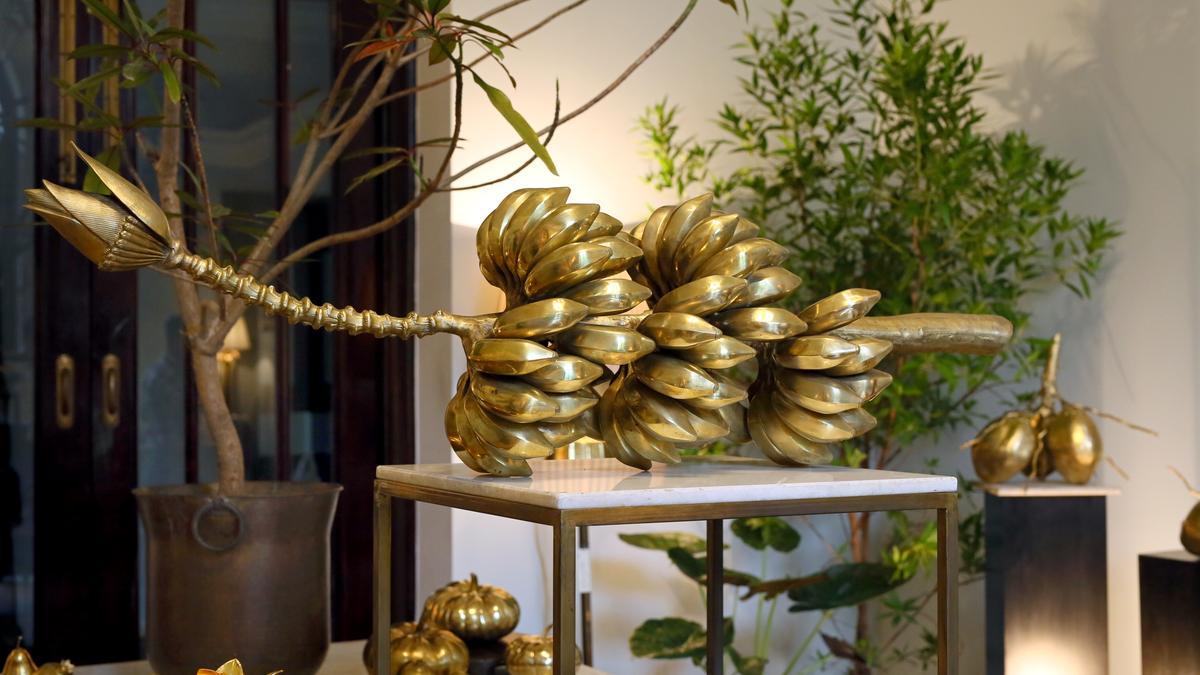
Born in a small village in the heart of Arunachal Pradesh called Tirbin, the eminent fashion designer Jenjum Gadi nurtures memories rooted deeply in the essence of his childhood spent at home. Growing up in an era of the 1980s where entertainment options were sparse, Gadi’s youth was filled with simplistic, nature-bound activities. His pursuits consisted of climbing trees, chasing bees, swimming in rivers, catching fish, and hiking in the picturesque mountains. Nature served as his lively playground, and it is from this intimate relationship with the natural world that he derives inspiration for his debut art show, Apase. The term ‘Apase’ translates to ‘assorted fruits’ in Gadi’s native Gato dialect, encapsulating the vivid tapestries of his past.
“In my village, every household boasts a garden. Instead of ornamental flowers, we nurture vegetables and fruits,” says Gadi. “My mother, who is a farmer, has spent her entire life in the village cultivating every fruit and vegetable in our garden.” His words illuminate a legacy born from the soil, a legacy that has profoundly influenced his creative journey. “Spending time there has imparted a lasting impact on my designs. Apase is an endeavor to revisit those cherished memories and breathe life into them through my art,” he asserts.
The debut exhibit Apase is currently gracing the halls of Bikaner House’s Vayu, showcasing a breathtaking array of 16 meticulously crafted three-dimensional fruit models, each rendered in solid brass. These models represent an assortment of fruits and vegetables from Gadi’s mother’s garden. At the heart of this exhibit lies a grand 12 x 44 inch banana bunch, while the rest of the fruits, including pineapples, papayas, jackfruits, lemons, pumpkins, and pomegranates, are displayed in modest clusters, quietly exuding an understated magnificence. The ambiance is further enhanced by the intoxicating fragrance of fresh jasmine flowers, creating an immersive jardin experience.
Creating this collection has been no small feat. During his journey, Gadi encountered local artisans in the small Arunachal Pradesh village of Rupa, who are adept at crafting traditional brass items for Tibetan monasteries. A subsequent visit to Tawang, the westernmost part of Arunachal Pradesh and home to the ancient second-largest Buddhist monastery in Asia, reinforced his fascination with the craft. He observed artisans utilizing real fruits as molds, transforming them into timeless brass masterpieces.
.
In his Delhi residence, Gadi cultivates a diverse range of fruits such as mangoes, papayas, avocados, custard apples, bananas, and lemons, seasonally. Yet, the artist’s favorite remains the orange. “Orange trees are typically thorny, but the thorns tend to disappear as the trees mature. I vividly recollect my childhood days spent plucking oranges and playing with friends in the orchard. The sweetness of the fruit was a delightful contrast to the occasional bruises we sustained from the thorns,” he reminisces fondly.
Jenjum Gadi’s contribution to the art and fashion world is monumental, notably as one of the few representatives from the Northeast of India. His meticulous work has drawn significant attention to this often-overlooked region, fostering discussions about its rich culture, culinary traditions, and pressing issues such as racism and discrimination. Despite these efforts, Gadi believes that the Northeast’s art landscape warrants further representation.
“The process of garnering attention is slow, but it has indeed started. One artist who stands out is Chandan Bez Baruah, a skilled printmaker raising awareness about life in the Northeast through his art. Now, a new generation of young artists from the region is emerging. The goal is to highlight their identities and origins creatively, chronicling their journeys as vividly as possible,” Gadi explains.
Jenjum Gadi’s multitude of talents span beyond designing clothes and creating art. He is also an actor who starred in the 2019 comedy-drama film Axone, directed by Nicholas Kharkongor. However, when asked about a potential return to the silver screen, Gadi laughs it off: “I was so shy and poor during my audition for Axone that even though they considered me for a leading role, I wasn’t cast. It’s unlikely I’ll be doing that again anytime soon,” he jests.
Apase remains on display at Bikaner House, inviting viewers to immerse themselves in the rich tapestry of Jenjum Gadi’s personal history and the natural beauty that springs from his mother’s nurturing garden.
Jenjum Gadi’s story is not only an homage to his roots but also a vivid portrayal of how deeply we are shaped by our upbringing and surroundings. His work, thus, becomes a symbolic bridge connecting memories of a rustic past with the sophisticated artistry of the present.












